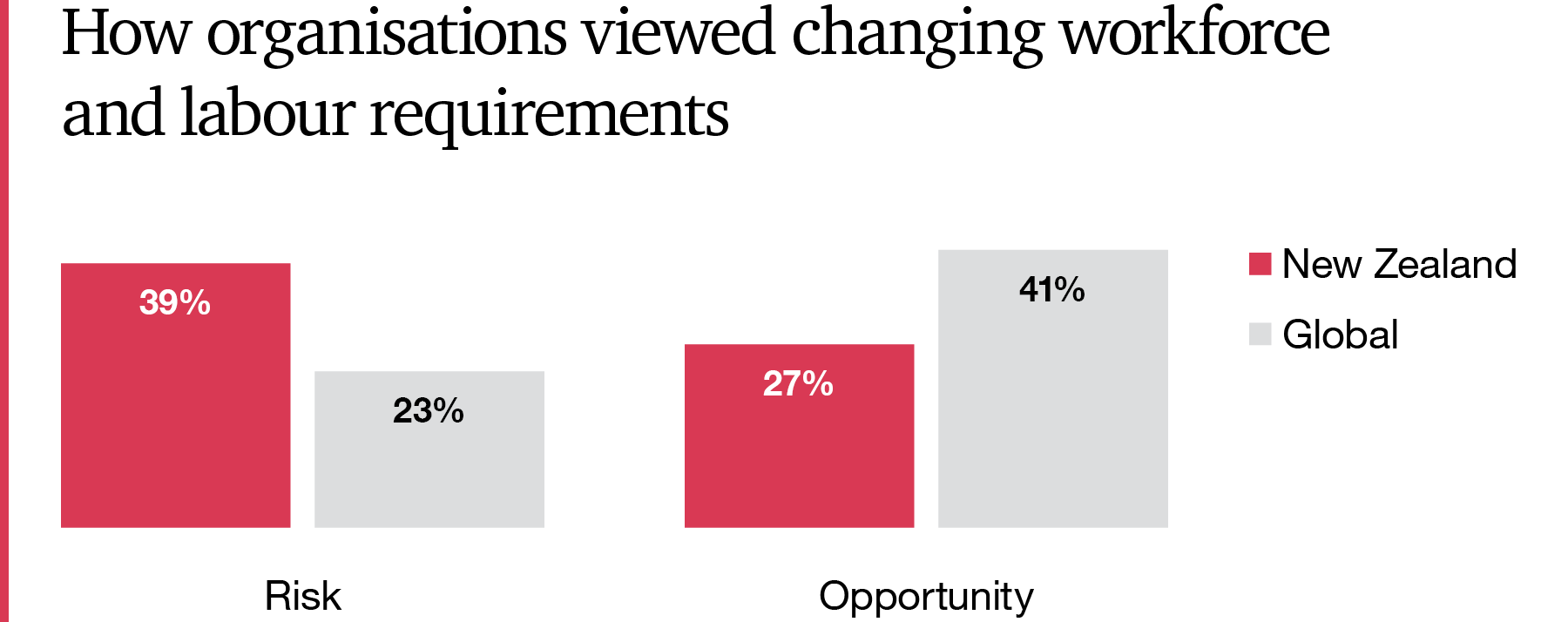New Zealand's workforce is at a critical juncture, facing significant challenges as the demands of the modern business landscape continue to evolve. In PwC’s recent Global Risk Survey, 39% of New Zealand respondents said that changing labour/skills requirements were ‘fully or mostly’ a risk, compared to 23% globally. On the other end of the spectrum, 27% of New Zealand respondents saw changing labour/skills requirements as 'fully or mostly' an opportunity, versus 41% globally.
Technological advancements, globalisation, and shifting demographics are all driving a change in workforce requirements. The rapid acceleration of technology and digitalisation, and the adoption of remote working practices, have highlighted the need for digital skills, adaptability, and flexibility. New Zealand business leaders need to upskill their workforce to ensure their organisation continues to thrive.

Understanding your skills requirements
Business leaders in New Zealand already recognise the imperative of upskilling and reskilling their workforce. In PwC’s Global CEO Survey, 64% of New Zealand respondents identified upskilling and reskilling their people as a key action for their organisation in the next 12 months. However, they grapple with uncertainty regarding the best approach to achieve this.
The absence of a clear roadmap for acquiring new skills and transitioning the existing workforce creates a sense of apprehension, and risk. The challenge lies in understanding the tangible actions required by organisations to move towards a skills-focused future, such as identifying necessary skills, implementing training programs, and facilitating a smooth transition. Addressing this uncertainty requires proactive planning, collaboration with educational institutions and training businesses, and exploration of alternative learning paths to ensure a skilled and adaptable workforce.
Business leaders must first understand the skills they currently have within their organisation and the skills they will need in the future. This forms the foundation for creating a comprehensive plan to bridge the gap. While it may not be an easy task, it is relatively straightforward to assess the skills present in the business today, going beyond job roles to identify the individual skills employees bring. Defining the skills needed in the future can be more challenging, but experts can assist in this process. By gaining clarity on the skills needed, businesses can create a strategic plan that includes upskilling, reskilling, and potentially restructuring the workforce to meet their evolving requirements.

Creating a sustainable skills pipeline
The New Zealand funded tertiary education system is working to meet the evolving demands of the workforce, but has faced a range of challenges over the past few years. A tight funding environment for educational organisations poses an ongoing challenge, requiring these organisations to make decisions around what skills and knowledge they choose to cater for, and how. This environment can impact an organisation's ability to invest in modern infrastructure, update curriculum, attract qualified educators, and provide students with access to cutting-edge technologies.

Business leaders should consider collaborating with educational organisations. Advocating for curriculum updates and industry partnerships will ensure educational organisations produce graduates with the skills businesses need, helping to reduce the skills gap.
Exploring alternative learning paths
Relying solely on traditional educational organisations may not be sufficient to address the skills challenges faced by businesses. Business leaders should also consider how they encourage their employees to upskill by exploring alternative learning paths outside of the funded educational system.
Online courses, certifications, and industry-specific training programmes delivered outside of the funded educational system in New Zealand also offer valuable opportunities for upskilling and reskilling. By providing support and resources, businesses can empower their workforce to acquire necessary skills in a rapidly changing environment.

Embracing new technologies through a culture of learning
Fostering a culture of learning is essential for businesses, especially when it comes to acquiring skills in new technologies like generative AI. Encouraging a mindset of continuous learning motivates employees to upskill and reskill, leading to better business outcomes. Businesses have significant opportunities to lead in this space and enable their workforce to drive adoption.
.jpeg)
To facilitate professional development, businesses can provide resources such as ongoing access to learning platforms, mentorship programmes, and internal training opportunities. This not only addresses skills challenges but also drives employee engagement and contributes to the employee value proposition. Many businesses are already embracing generative AI, and it is crucial for organisations to navigate this transition by providing employees with the necessary tools and training, empowering them to explore AI solutions while managing risks and ensuring compliance.
Collaborating with government and industry
Despite the challenges, there are opportunities for the government and businesses to work together to address the skills gap. Singapore’s ‘SkillsFuture Programme’ is an example of moving away from the traditional 'front-loading' of education, and provides multiple entry points for the workforce to continually upskill and reskill during their working lives.
Business leaders should engage with the government and industry associations to advocate for policies and initiatives that support upskilling and reskilling efforts. By working together, stakeholders can create funding opportunities and establish frameworks for lifelong learning. Government consideration of how existing and/or new funding streams could support life-long upskilling and reskilling will be critical to ensure that the New Zealand workforce can continually develop skills that will meet the demands of the evolving business landscape.

Enabling the skills to thrive
New Zealand's workforce needs to evolve to meet the changing requirements of businesses. By taking proactive actions, such as understanding current and future skills, collaborating with educational organisations and stakeholders, exploring alternative learning paths, advocating for funding and policy changes, and fostering a culture of learning, businesses can bridge the skills gap and ensure a productive and competitive future. Addressing these challenges requires a collective effort from government, educational institutions, and businesses to equip the workforce with the skills needed to thrive in the evolving business landscape.
Author: Griere Cox
Are you a Risk Pioneer? Take our real-time benchmarking survey.
This ten-minute survey will compare your responses with our global study data to help you explore your approach to risk and reveal your risk archetype.

Contact us
If you’d like to learn more about the survey, or talk about any of the topics covered, please reach out to one of our team or click here.
Partner, Financial Advisory Services, Wellington, PwC New Zealand










